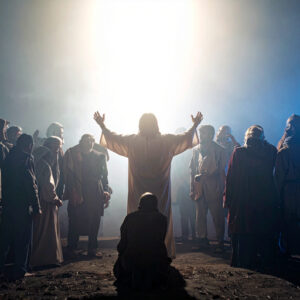 Yeshua, Purification, and Restoration
Yeshua, Purification, and Restoration
This teaching explores Yeshua’s healing of lepers as a powerful symbol of spiritual purification and restoration. It contrasts the Messiah’s humble first coming with His future exalted reign, showing how Yeshua fulfilled both Jewish prophecy and the role of Redeemer through His compassion, suffering, and promise of return.
“Now on His way to Jerusalem, Yeshua traveled along the border between Samaria and Galilee. As He was going into a village, ten men who had leprosy met Him. They stood at a distance and called out in a loud voice, ‘Yeshua, Master, have pity on us!’ When Yeshua saw them, He said, ‘Go, show yourselves to the priests.’ And as they went, they were cleansed.” (Luke 17:11–14)
Yeshua the Messiah, during the time of His ministry on earth, healed many people who were afflicted by this terrible condition.
Yeshua upheld the process of purification found in this Parasha when He healed a leper, declaring him tahor (clean).
“Lord, if you are willing, you can make me clean.’ Yeshua reached out His hand and touched the man. ‘I am willing,’ He said. ‘Be clean!’ And immediately the leprosy left him.” (Luke 5:12–13)
Keeping the Jewish law, Yeshua told the man, “Show yourself to the priest and offer the sacrifices that Moses commanded for your cleansing, as a testimony to them.”
In Luke 17, Yeshua heals ten men of leprosy, but only one returns to thank Him. Again, Yeshua tells them to report their healing to the priest.
Just as these lepers needed to report to the Jewish priest, so too do those who have been defiled by gross sin need a system of accountability to those in positions of spiritual leadership.
The Messiah: Humble and Exalted
One Jewish interpretation of the Messiah, expects Him to be high, mighty, and exalted, not lowly, afflicted or one who is associated with sinners or lepers.
This idea is based on Isaiah 52:13: “My servant shall be wise, exalted and lofty, and shall be very high.”
How can we reconcile these two descriptions of the Messiah? In His first coming, Yeshua came as a lowly servant, entering Jerusalem on a donkey.
He ate with sinners and associated with tax collectors — behavior for which He was misunderstood and despised.
He died as the humble lamb led to the slaughter to make atonement for our sins.
“But He was pierced for our transgressions, He was crushed for our iniquities; the punishment that brought us peace was on Him, and by His wounds we are healed.” (Isaiah 53:5)
Yeshua did not come for the proud and righteous, but for the lepers of society — those who are poor, humble, sick, and outcast.
To illustrate this truth, Yeshua told a parable:
“Two men went up to the temple to pray, one a Pharisee and the other a tax collector. The Pharisee stood by himself and prayed: ‘God, I thank you that I am not like other people—robbers, evildoers, adulterers — or even like this tax collector. I fast twice a week and give a tenth of all I get.’
“But the tax collector stood at a distance. He would not even look up to heaven, but beat his breast and said, ‘God, have mercy on me, a sinner.’ I tell you that this man, rather than the other, went home justified before God. For all those who exalt themselves will be humbled, and those who humble themselves will be exalted.” (Luke 18:10–14)
According to Jewish thought, the Moshiach (Messiah) Redeemer suffers the agonies of tzaraat by taking upon Himself and personally suffering the pain of His people in exile (galut).
It is traditionally believed that the day of purification in this Torah reading, refers to the day of redemption when the Messiah comes. As Believers, we understand that Yeshua did fulfill this.
“He himself bore our sins in His body on the stake, so that we might die to sins and live for righteousness — by His wounds you were healed.” (1 Peter 2:24)
As well, the Messiah will come again to heal all tzaraat in our world. On that day, He will be exalted to rule and reign forever upon the Throne of David. Jewish exile will be a thing of the past, and His people will dwell securely in their own land.
“Of the greatness of His government and peace there will be no end. He will reign on David’s throne and over His kingdom, establishing and upholding it with justice and righteousness from that time on and forever.” (Isaiah 9:7)
In that time,
“Justice will be the belt around His waist, faithfulness the sash around His hips. The wolf will live with the lamb; the leopard lie down with the kid; calf, young lion and fattened lamb together, with a little child to lead them.” (Isaiah 11:5–6)
That time is right around the corner, Yeshua is returning soon.
As the day draws ever closer, so work to bring the Good News of Yeshua to the Jewish People and to all other peoples of the world.
“Look, I am coming soon! My reward is with Me, and I will give to each person according to what they have done.” (Matthew 16:27)
Shalom!
Rabbi Douglas
